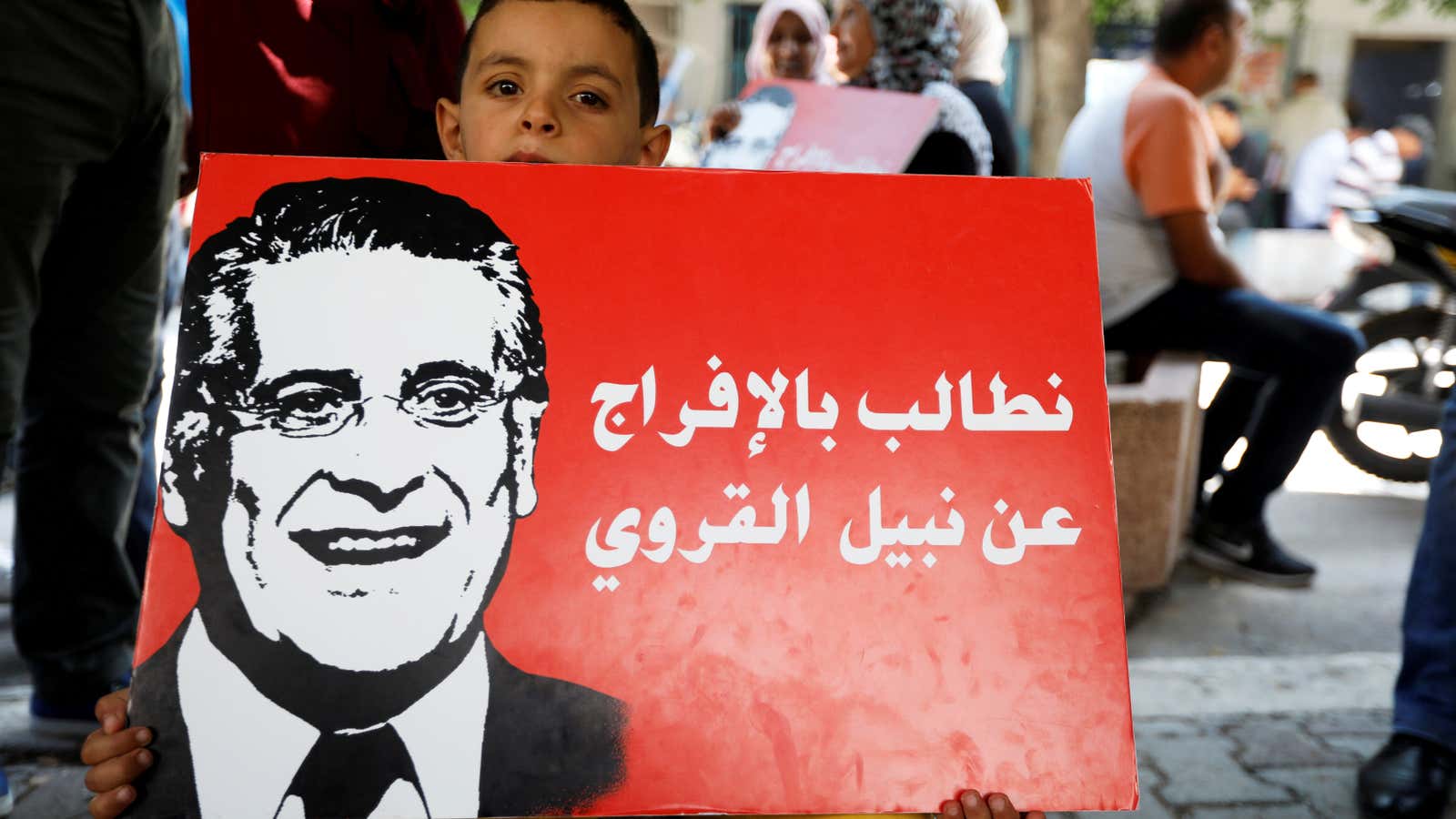Tunisians head to the polls this weekend (Sept. 15) to elect a new president, with results due a few days later. This will be Tunisia’s second presidential election since the 2011 revolution—and its third free election since independence in 1956. It’s a crucial test for the young democracy, and the stakes are high.
There are 26 candidates in the running. Among them are a frontrunner behind bars, two women, the country’s first openly gay contender, and a candidate from the Islamist Ennahda party. Analysts worry that some leading contenders could set the country back and threaten to derail its path to becoming a reliable democracy.
That would be a bleak development for Tunisia, which kickstarted the so-called Arab Spring—the 2011 pro-democracy uprisings that swept across the region. Tunisia remains the only country to transition successfully—albeit not easily—to democracy since then.
Tunisia’s election was supposed to take place on Nov. 17, but it was moved up after the country’s first democratically elected president, Beji Caid Essebsi, died this summer at the ripe age of 92. Mohamed Ennaceur, the leader of the secularist Nidaa Tounes party that Essebsi founded in 2012, took over as interim president in July.
Here are some of the leading candidates in the race:
Nabil Karoui
Known as Tunisia’s “Berlusconi,” after the scandal-plagued former Italian leader, Karoui is one of the country’s most influential media moguls. He is also in prison on suspicion of money laundering and tax evasion. Despite that inconvenience, he is ahead of all the other candidates in recent polls. His critics say he unfairly used his powerful television station to boost his electoral fortunes. Karoui’s party says his arrest was politically motivated.
The country’s electoral body ruled that Karoui is eligible to run while awaiting a verdict. But if he’s found guilty, he would not be allowed to take office. So if he does win, and then he’s later found guilty, that could usher in a political crisis.
Youssef Chahed
Currently prime minister, Chahed is an establishment figure running on a platform of fighting corruption. He has also pushed through deep spending cuts while in government, to comply with an IMF loan package, and these have hurt poor Tunisians. Chahed has come under criticism for running for the presidency while serving as prime minister, accused of using state resources to help his election campaign.
Abdelfatah Mourou
After declining to field a candidate in Tunisia’s first free presidential election, Ennahda, the country’s largest political group, has tapped its vice president Mourou to run this time around. Ennahda is considered a mild Islamist party, and has abandoned its decades-old role as a religious movement in favor of party politics. Ennahda has governed in coalition with secularists, including those affiliated with the pre-revolution regime.
Kaïs Saïed
The independent Saïed is a law professor at the University of Tunis. He holds particularly conservative social views, including bringing back the death penalty, and has made inflammatory comments about homosexuality. Saïed has expressed support for centralizing power, and has polled well (Facebook link in Arabic).
Abir Moussi
The leading female candidate for president, Moussi heads the Free Destourian Party set up by former members of Tunisia’s ruling party before the 2011 revolution. Moussi is a supporter of deposed president Zine El Abidine Ben Ali. Polls have showed her with double digit (link in Arabic) support—but a Moussi win might not bode well for Tunisian democracy.
Abdelkarim Zbidi
Zbidi is a former minister of defense, having resigned to run for president. A close ally of the late Essebsi, he’s an independent candidate who has criticized Ennahda in the past, but said he could work with them. Zbidi has called for strengthened executive powers—suggesting that the country’s hybrid presidential and parliamentary system is inefficient. Like Moussi, he is a former member of Ben Ali’s political vehicle, which ruled Tunisia with a strong arm for more than 50 years.
After the vote
If no candidate receives a majority, which happened in 2014, then a runoff with the top two candidates will follow no later than early November. Parliamentary elections are also due on Oct. 6.
